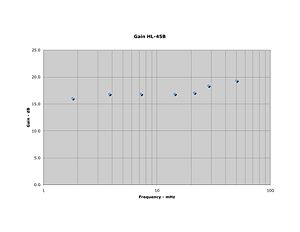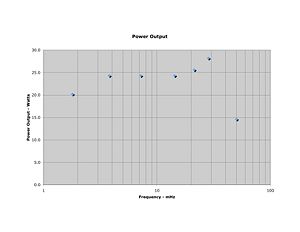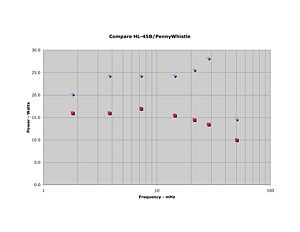Difference between revisions of "The Tokyo Hy-Power HL-45B Solution"
(→The Direct Connection Option: added start of the full output option) |
(moved fig. 1-3 up) |
||
| Line 1: | Line 1: | ||
| + | [[Image:0001ii.jpg|thumb|300px|Figure #1. The measured gain of the HL-45B HF/6 Meter Amplifier]] | ||
| + | [[Image:0001gz.jpg|thumb|300px|Figure #2. The measured power output of the HL-45B HF/6 Meter Amplifier at 13.8 Volts]] | ||
| + | [[Image:0001vl.jpg|thumb|300px|Figure #3. A comparison of the HL-45B HF/6 Meter Amplifier power output to the PenneyWhistle power output when both are operated at 13.8 Volts]] | ||
The HL-45B is a small compact HF and 6 meter amplifier capable of 45 Watts output on all modes. Band switching is manual, but all required low pass filters are included. Because it requires 5 Watts input to drive it to full power, detailed construction notes are provided to provide a small preamp between the Penelope and HL-45B. | The HL-45B is a small compact HF and 6 meter amplifier capable of 45 Watts output on all modes. Band switching is manual, but all required low pass filters are included. Because it requires 5 Watts input to drive it to full power, detailed construction notes are provided to provide a small preamp between the Penelope and HL-45B. | ||
| − | Specifications and other information on the Tokyo Hy-Power labs' HL-45B are available at [http://www.thp.co.jp/english/hl_45b_e.html Tokyo Hy-Power's web site]. The measured Gain of this amplifier is shown in Figure #1. | + | Specifications and other information on the Tokyo Hy-Power labs' HL-45B are available at [http://www.thp.co.jp/english/hl_45b_e.html Tokyo Hy-Power's web site]. The measured Gain of this amplifier is shown in Figure #1. |
===The Direct Connection Option=== | ===The Direct Connection Option=== | ||
| − | Phil Crosno, N6AS, did the initial work on the selection of this amplifier to provide additional power output for a HPSDR rig. His power output of a directly connected HL-45B to a Penelope/Mercury based transceiver is shown in Figure #2. Comparison of the HL-45B to the power output of the PenneyWhistle is shown in Figure #3 (using Penelope as the driver at 13.8 Volts in both cases). | + | Phil Crosno, N6AS, did the initial work on the selection of this amplifier to provide additional power output for a HPSDR rig. His power output of a directly connected HL-45B to a Penelope/Mercury based transceiver is shown in Figure #2. Comparison of the HL-45B to the power output of the PenneyWhistle is shown in Figure #3 (using Penelope as the driver at 13.8 Volts in both cases). |
| − | + | ||
Revision as of 19:16, 30 September 2009
The HL-45B is a small compact HF and 6 meter amplifier capable of 45 Watts output on all modes. Band switching is manual, but all required low pass filters are included. Because it requires 5 Watts input to drive it to full power, detailed construction notes are provided to provide a small preamp between the Penelope and HL-45B. Specifications and other information on the Tokyo Hy-Power labs' HL-45B are available at Tokyo Hy-Power's web site. The measured Gain of this amplifier is shown in Figure #1.
The Direct Connection Option
Phil Crosno, N6AS, did the initial work on the selection of this amplifier to provide additional power output for a HPSDR rig. His power output of a directly connected HL-45B to a Penelope/Mercury based transceiver is shown in Figure #2. Comparison of the HL-45B to the power output of the PenneyWhistle is shown in Figure #3 (using Penelope as the driver at 13.8 Volts in both cases).
The Full Output Option
David Poole, AD9DP, has developed a single transistor interface circuit that goes between the current Penelope/Mercury HPSDR components to drive the HL-45B to full power. Details on construction of this interface will be posted here as soon as testing is complete.


